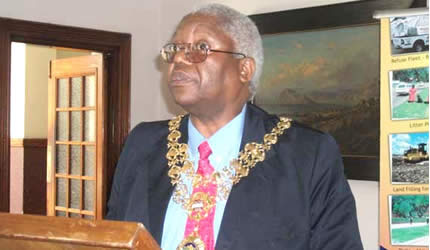Harare Water scam

losing millions of dollars every month to a well-orchestrated scandal involving workers in the water department and some ratepayers.
At least two employees from the revenue collection division of the city treasurer’s department have since appeared in court over the matter, while a third one is expected to appear soon.
Mayor Muchadeyi Masunda said yesterday that investigations were continuing and more evidence of the scam was being unearthed.
“There is a scam that has just been unearthed in Harare Water following a forensic audit which was carried out by a reputable firm of chartered accountants,” he said.
“The investigations are well under way and will continue until all those who have dipped their hands in the cookie jar have been brought to book.”
Although Mr Masunda said the quantum of the financial prejudice had not yet been established, sources said the city was losing millions of dollars each month.
Mr Masunda said evidence at hand showed that there had been collusion “among our accounting personnel and a variety of ratepayers”.
He said the “long arm of the law is taking its course, without fear or favour against those of our employees who have been implicated in the scam”.
Reports from city sources indicated that some of the officials involved in the scam had already left the country.
The sources said the city workers would issue non-computerised receipts to ratepayers and not credit the amounts to the city revenue base.
In some instances they would ask the residents to pay a certain amount and have their debts cancelled.
Harare Water runs its own accounts divorced from the city treasurer’s department and there are accusations that it was not operating within the laid down accounting systems.
Dr Tendai Mahachi briefed councillors in private about the scam during a full council meeting last week, but declined to make a public statement.
Harare Water director Eng Christopher Zvobgo reported recently that revenue slumped from a peak of US$6,7 million in November to US$3,6 million in January.
He attributed the fall to non-payment of bills by consumers. Eng Zvobgo said the failure to pay bills by residents was affecting the city’s scheduled maintenance programmes of the water infrastructure and was making it impossible to procure water treatment chemicals.
The city recently published a notice dissuading ratepayers from parting with their hard earned cash to city employees without being issued with machine processed receipts.








Comments